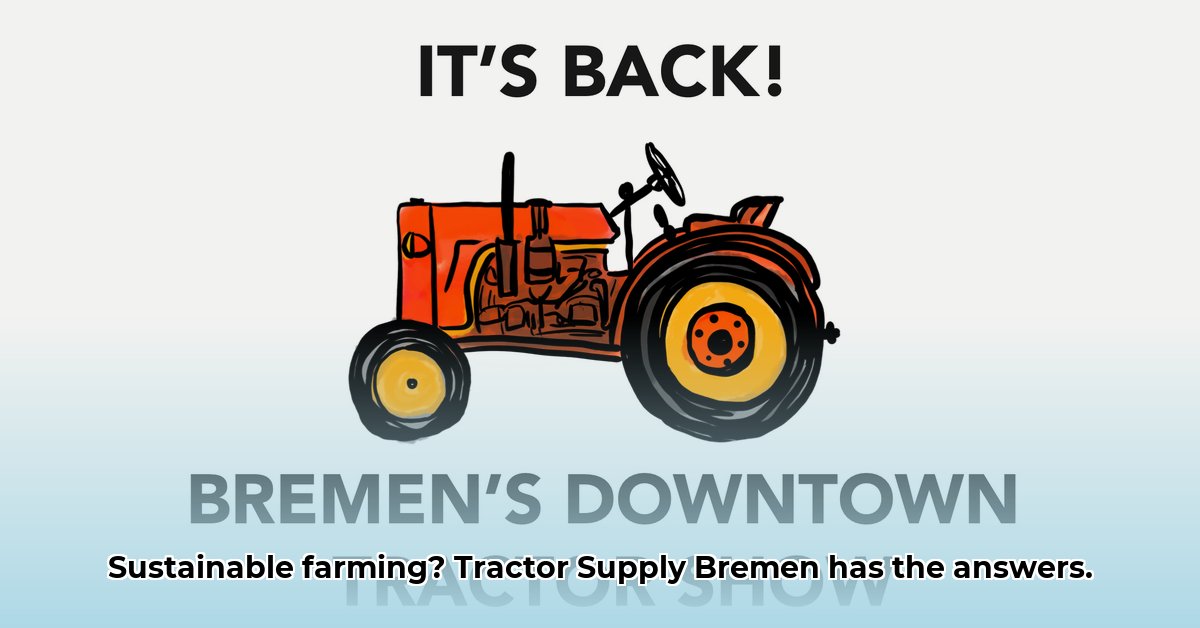
Tractor Supply (TSC) plays a significant role in supporting the agricultural community in Bremen, Georgia. This article assesses TSC Bremen's contribution to sustainable farming practices, analyzing its product offerings, supply chain, community engagement, and preparedness for future regulations. Our analysis will reveal areas of strength and areas needing improvement, ultimately outlining actionable steps to enhance TSC's role in promoting environmentally responsible agriculture.
TSC Bremen's Product Offering: A Sustainable Assessment
TSC Bremen offers a range of products relevant to sustainable agriculture, including organic seeds, natural fertilizers, and livestock feed formulated for optimal animal health and minimized environmental impact. However, a comprehensive comparison against competitors specializing in sustainable agriculture is needed to fully evaluate its market position. Analyzing the nutritional content and sourcing of livestock feed, for instance, would provide a clearer picture of TSC's commitment to sustainable practices. Furthermore, understanding the local demographics and purchasing patterns within the Bremen community would allow TSC to tailor its offerings to better meet the specific needs and demands of its clientele. This detailed analysis includes a comparison of organic seed varieties offered, the availability of bio-pesticides and other natural pest control solutions, and the proportion of locally sourced products available at the Bremen store compared to other locations. Do they offer a comparable range of sustainable options as stores explicitly focused on organic and sustainable agriculture?
TSC Bremen's Supply Chain: A Sustainability Audit
Assessing TSC Bremen's supply chain requires a lifecycle assessment (LCA) of its key product lines. An LCA would quantitatively identify environmental impacts throughout a product’s life, from raw material extraction to disposal. This transparency is crucial for evaluating the overall environmental footprint of TSC’s operations. A comprehensive risk assessment is also paramount, identifying and quantifying the likelihood and potential severity of environmental and social risks associated with the current supply chain. This proactive approach enables TSC to develop mitigation strategies, build operational resilience, and proactively address any potential issues. This analysis should include an examination of packaging materials (recyclability, compostability), transportation methods (fuel efficiency), and supplier ethical sourcing practices. Are suppliers adhering to fair labor standards and environmental best practices?
TSC Bremen's Engagement with Sustainable Practices: Beyond Products
TSC Bremen's impact extends beyond its product offerings. The effectiveness of any existing educational initiatives or partnerships needs thorough evaluation. In-store workshops or easily accessible online resources on sustainable farming practices, combined with collaborations with local agricultural extension services or NGOs such as the Environmental Protection Agency (EPA), would significantly amplify TSC's positive influence in the community. The absence of such programs currently limits its potential for community engagement. How is TSC Bremen supporting local farmers in adopting best practices? What educational resources are being provided? This lack of visible engagement prevents the retailer from fully realizing its potential as a leader in promoting sustainable agriculture.
Regulatory Landscape and Future Implications: Adapting to Change
The regulatory landscape concerning sustainable agriculture is constantly evolving. Future regulations regarding labeling, packaging, and emissions will significantly impact TSC Bremen's operations. Proactive engagement with regulatory agencies, such as the Georgia Department of Agriculture, is crucial to ensure compliance and prevent costly operational disruptions. Adapting to evolving environmental standards is vital for long-term success. Anticipating and responding to future regulations will allow TSC to maintain its market position and avoid potential legal issues. This section should explore current and anticipated regulations impacting TSC and its suppliers, outlining potential strategies for effective compliance.
Conclusions and Recommendations: A Path Towards Sustainable Agriculture
TSC Bremen possesses the potential to become a significant advocate for sustainable agriculture in the Bremen area. However, realizing this potential demands proactive steps across multiple areas. TSC must engage in a comprehensive LCA and risk assessment of its supply chain, improve transparency around sourcing practices, and invest in educational and community engagement initiatives. Farmers should actively use TSC's resources, making informed purchasing choices. Consumers need to demand transparent labeling and support businesses actively prioritizing sustainability. Regulatory bodies should collaborate with TSC to facilitate compliance and promote wider adoption of sustainable agricultural practices. By working together, TSC, farmers, consumers, and regulatory bodies can create a more sustainable agriculture future.
Key Takeaways:
- TSC Bremen presents a mixed picture regarding its commitment to sustainable agriculture. Its product range shows promise, yet a comprehensive analysis of its supply chain and community engagement is needed.
- A lifecycle assessment and risk assessment are critical for evaluating the true environmental impact of TSC's operations.
- Proactive engagement with regulatory bodies and collaborative initiatives with local farmers and NGOs are essential for TSC’s long-term contribution to a sustainable agricultural community.